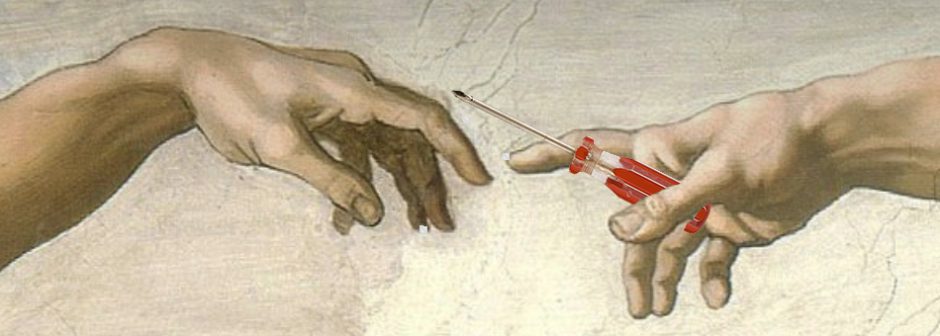Wanna hear this sermon as preached at UCJ? Just press the button, and it’ll play…
Delivered at United Church of Jaffrey.
October 14th , 2018
If religion addresses a genuine sphere of understanding and human necessity, then it should be susceptible to progress; its doctrines should become more useful, rather than less. Progress in religion, as in other fields, would have to be a matter of present inquiry, not the mere reiteration of past doctrine. Whatever is true now should be discoverable now, and describable in terms that are not an outright affront to the rest of what we know about the world. – From The End of Faith by Sam Harris

The Difference
Lets start things off this morning with a little exercise.
Don’t worry you haven’t mistakenly wondered into a yoga class – this is going to be a mental exercise.
I want you to imagine that I am holding “religion” in my right hand.
Now, if you would be so kind, please consider this Phillip’s head screwdriver that I hold in my left hand.
Religion.
Phillips head screwdriver.
Religion.
Phillips head screwdriver.
The first thing to notice is that there is nothing in my right hand.
Religion is not a thing…
But the Phillips Head screwdriver in my left hand is a thing. It is a physical object that I can hold in my hand.
Even though this seems obvious enough, it’s an important distinction.
Religion does not have a specific physical reality, like a Phillips Head screwdriver.
Sure, we have symbols, like the cross, the star and crescent, and the star of David. When we see a cross or a crucifix, we think “Christianity” –
the star and crescent symbolizes Islam;
The star of David is the symbol for Judaism.
If I’d held up one of these things you would have understood that I was holding up a religious object.
But still – these things symbolize religion. The Phillips Head screwdriver does not symbolize a Phillips head screwdriver.
It is a Phillips head screwdriver.
Standardized Specifications
The other day I was cleaning the kitchen.
Well, everyday I clean the kitchen!
But the other day when I was cleaning the kitchen, I filled the dishwasher with dishes.
I put dishwasher detergent in the dishwasher.
And I closed the dishwasher.
Or rather, I tried to close the dishwasher.
The dishwasher door would not close!
I checked to see if there was a dish or a piece of silverware getting in the way.
There was no dish or piece of silverware getting in the way.
I tried to close the dishwasher again.
No dice.
After a good deal of head-scratching and some neck-craning, I discovered the problem. The dishwasher itself was secured to the kitchen counter by a few well-placed screws – one of which had worked itself loose enough to get in the way of the closing door.
So… you guessed it… I went and got a Phillips Head screwdriver and, tightened the screw. The dishwasher door promptly complied with my wishes, closing with a satisfying thump.
Who has not experienced this joy? Each of us – even me – has an “inner engineer” who feels a surge of exultation when the right tool is used at the right moment, and everything comes true. You use it, and boom the job is done.
Problem?
Solution!
Elegant.
Sufficient…
Ahh!
Human ingenuity serves us this kind of profound satisfaction.
Every hardware store in every town is a paradise of “standardized specifications.”
Match the Phillip’s head screw with the correct Phillip’s heads screwdriver,
Add a little elbow grease
And cinch up your world! Watch it tighten up, all level and true.
Voila!
It’s a beautiful thing!
Let your mind wander up and away from the humble Phillip’s head screwdriver, and you quickly encounter other, more sophisticated tools that automate, calculate, percolate, medicate and illuminate.
Its great!
Technology itself is a pageant of “standardized specifications.”
When things fit together, they work well.
Imagine if we humans all had Phillip’s heads!
How great would that be?
But we don’t.
Discovering Purpose
Thank God!
Thank God human beings are not manufactured according to standardized specifications!
What is good for screws and screwdrivers is decidedly not good for humans.
Don’t get close to me with any “standardized specifications.”
Its true, a 3-inch Phillips head wood screw is a thing of beauty when it is matched with the right bit.
I challenge any 2-inch piece of wood to defy my desire to secure it to the wall.
But all this elegance derives from singularity of purpose.
Screws and screwdrivers only do one thing and one thing only – they securing things.
But humans and lemurs and fire ants and humpback whales and blue-footed booby’s and water buffalos and Brussel Sprouts and Labra-Doodles all have something that screws and screwdrivers don’t have.
We have life.
And life is inexact.
Life is inexact because life does not have singularity of purpose. Life has indeterminate meaning.
We do not exist simply to fasten things.
We exist to pollinate, congregate, migrate, hibernate, consummate and germinate.
Its great!
To be alive is to be unpredictable.
For a living thing, purpose is not a single pre-ordained thing, like fastening two boards together.
Every time we take a living thing and limit its nature to a singular purpose, we oppress it.
We do this a lot – from chickens
(is chicken a bird, or a dinner?)
to movie stars
(is Marilyn Monroe a person, or a sex symbol?)
When we define a living thing according to our needs or desires, we deprive it of its greatest joy – its discovery of self.
A living thing does not have a singular purpose.
A living thing discovers its purpose.
That’s what life is for – for discovering purpose.
And for this reason, religion is not something that I can hold in my hand.
Religion is not – or, rather, I believe it should not be – an object manufactured to “standardized specifications.”
Wielding it as a tool is a perilous thing to do.
When, in the course of human history, religion has been used as a tool to achieve a singular purpose – things swiftly and tragically went wrong.
I am thinking of the ministers who quoted the apostle Paul to justify the institution of slavery.
The Emperor of Japan, who used his “divine” status to start an imperialist war of aggression.
The 9/11 hijackers who believed their actions guaranteed them a place in paradise.
Crusade,
pogrom,
ethnic cleansing,
Terrorism
imperialist aggression.
Throughout history, religion has repeatedly been cited as the justification for the most horrific acts of violence.
You may not be able to hold religion in your hand, but that does not stop it from being a terrible force.
One can make the argument that the two things that I asked you to consider at the beginning of this sermon…
(Right hand) Religion …
and
(left hand) the Phillip’s head screwdriver
Are two of the most powerful forces in human history.
(Left) We’ve grabbed onto tools (with all their “standardized specifications”) and made bridges, airplanes, skyscrapers, highways, hospitals.
The edifice of human civilization in the palm of my hand!
And with religion, we’ve developed strains and habits of belief – beliefs that have been a powerful force of both peril and compassion, strife, and grace, war and peace.
Relevant Mystery
Do you remember the reading from Sam Harris that I read earlier?
Its printed in the insert of today’s bulletin.
Harris, who is famous for being among the most strident of the “new atheists” proclaims, in no uncertain terms, that religion is “an outright affront to what we know about the world” because it stubbornly refuses to be “discoverable now.” He thinks religious people have an overwrought fidelity to doctrine – for no other reason than that it’s doctrine. Religion, he says, should be “a matter of present inquiry” – and if it cannot rise to this challenge, it should get out of the way.
I like this challenge. I agree with the sentiment.
As you can imagine, though, I’m not keen on the idea of getting rid of religion altogether. I agree with the notion that religion must be made relevant to the world we live in.
It must be “now.”
The religions of the world ought to stand up to this challenge.
However, I have some problems with what Harris says. I think he misses the point when he assumes that religion has any ambition of being a “genuine sphere of human understanding.”
We do not “understand” religion.
Religion, to me, is not a genuine sphere of human understanding.
Religion is a genuine sphere of divine mystery.
The relevance of religion starts from the improbable assumption that there is a fundamental unknown at the core of our experience.
This mystery remains outside understanding.
It cannot be isolated in a test tube or scrutinized under a microscope.
To understand something is to limit it.
This is why our scriptures — the Bible — can be so peculiar!
This is why psalm 22, that I read earlier can say two different things about God in seemingly the same breath.
O my God, I cry by day, but you do not answer;
and by night, but find no rest.
Yet you are holy, enthroned on the praises of Israel.
In you our ancestors trusted; they trusted, and you delivered them.
We cannot limit mystery. And so this mystery is both the trusted deliverer of Israel, and the God who does not answer.
We cannot define God, because God does not come manufactured to standardized specifications
How then, can we make religion relevant to the world we live in?
Does something have to be data to be relevant?
Do we have to be able to prod it and poke it and dissect it in order for it to be relevant?
Mystery is relevant because it is at the heart of our experience of beauty.
Mystery gives power to poetry,
to Music,
to Prayer
Mystery is relevant because it is at the heart of how we love each other
Did you make a spreadsheet when you fell in love?
Was logical, empirical calculation anywhere nearby when you held your child in your arms for the first time?
No.
This is mystery. Relevant mystery.
We love and we are humble before mystery.
My faith in God starts from this humility.
Amen.

